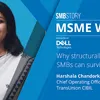MSME Week: How MSMEs are championing India’s technology-led transformation
As part of the MSME week, SMBStory organised a panel discussion, powered by TransUnion CIBIL, on June 27 to understand how MSMEs are using technology to survive the coronavirus crisis.
The COVID-19 crisis has crippled the MSME sector, which contributes 30 percent to the Gross Domestic Product (GDP). Till February 2020, India was making plans to reach the goal of becoming a $5 trillion economy by 2024-25. Moreover, MSMEs were seen as an important catalyst in helping India achieve this grand target. The pandemic, which led to a nationwide lockdown starting from the end of March, tossed the financial health of the economy.
To understand the various ways in which MSMEs are adopting technology to survive the crisis, SMBStory organised a panel discussion on ‘How MSMEs are championing India’s technology-led transformation’ at the Grand Finale (June 27) of the MSME week, powered by TransUnion CIBIL — India's first credit information company.

The panel was moderated by Ramarko Sengupta, Senior Editor, YourStory, and the guest speakers were Sandip Chhettri, COO, TradeIndia; Nath Parameshwaram, Director, PayPal India; Gaurav Khatri, Co-founder, Noise Audio; and Mahesh Ramamoorthy, Managing Director, APMEA- Banking and Payments, FIS.
The Grand Finale saw the MSME Week celebrations coming to an end with multiple pointers discussed on how the MSMEs can be revived.
Digital transformation
A lot has happened ever since the pandemic emerged last year and reached India’s shores earlier this year. The crisis has proven to be a game-changer, especially for the micro, small and medium enterprises which have been compelled to adapt to the new normal.
COVID-19 has, more importantly, pushed MSMEs to digitise quickly.
Sandip of TradeIndia pointed out that the letter ‘E’ — such as in ‘essential goods’, ‘ecommerce’, ‘e-learning’, and many more — has been making rounds for some time now. He also added that there was a lot of “resistance from the SMEs to adopt technologies.”
Nath of PayPal India, added that COVID-19 is an opportunity for small and medium businesses (SMBs) to adopt technology in order to survive the crisis and thrive afterwards. He said, “Entrepreneurs who are 50,60, or even 70 years old are ready to go online.”
He also added that the consumers have now become more aware and they want to know who are the producers of a product and how are these products being manufactured and sold.
Gaurav of Noise Audio also noted that COVID-19 will help MSMEs expand their consumer base like never before.
The fintech upsurge
One of the biggest consequences of going digital is using online platforms for transactions.
This remains a grey territory to venture into but SMBs have no choice but to embrace it as contactless transactions will be a significant part of the new normal.
Mahesh of FIS said that there is still fear among smaller players when it comes to adopting digital payments. He explained, “Lack of trust is a big concern because what happens when the money doesn’t come to them?”
Nath responded by saying that frauds were happening even in cash and cheque transactions, and people who were committing such crimes will now move online. He believed that it is not entirely possible to eliminate crimes and frauds but companies must take greater care when it comes to the cybersecurity of their users.
Mahesh further added that retina-based approvals and QR codes will gain larger cognisance and adoption in the domain of frictionless payments.
All panellists also agreed that fintech players have to update their fraud management systems and come up with a redressal mechanism to meet the surge in demand for online payments.
Decoding automation
Automation is being touted as the next big thing that will define a large part of how MSMEs operate.
The moderator also touched upon the parallel debate going on with regard to widespread job loss in the automation sector in an already weak economy.
Gaurav then stepped in to say that automation has become a forceful part of any business and they must come up with ways to cope with it in a way that doesn’t result in job losses. “Businesses need technology to improve. Entrepreneurs must have a vision and understanding of how their business will be a year down the line.”
Watch the full video below-
Edited by Kanishk Singh









